Flourish FM
What does it take to flourish? We started Flourish FM to share cutting edge research from world experts on how to thrive, so you can take away big ideas and practical steps to enhance your life, the lives of others, and, ultimately, make the world a better place. Flourish FM is hosted by Dr. Jon Beale and Dr. Nick Holton, and in collaboration with the Human Flourishing Program at Harvard University, the Department of Education at the University of Oxford, and The Shipley School.
Episodes
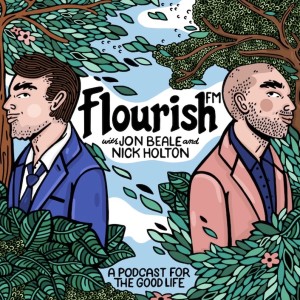
Tuesday Feb 28, 2023
Tuesday Feb 28, 2023
In this episode, we talked to Dr. Gilda Scarfe, expert on mental toughness, about what mental toughness is and how to build it.
Gilda Scarfe is the founder and CEO of Positive Ed & the Mental Toughness Institute, and a member of the advisory board for the Global Flourishing Study, led by the Human Flourishing Program at Harvard University, Baylor University and Gallup. Gilda is a positive psychology practitioner and mental toughness expert with a Ph.D. in the conceptualization of mental toughness and its application in education. She has worked in performance psychology, mental toughness, and leadership science for over 15 years.
Gilda specializes in the design and implementation of flourishing and mental toughness in learning, decision-making, quality of relationships, performance, and organizational climate; measuring mental toughness; and the influence of mental toughness training on key life outcomes.
Gilda is an international keynote speaker and consults around the world with school and Fortune 500 companies on best practices for integrating wellbeing, mental toughness and positive psychology domains into training and product design. She works with global businesses, high-growth startups, individuals, elite athletes, coaches and teams.
Key conversation points:
What mental toughness is: Gilda’s “SCARFE” model of mental toughness, consisting of Self-efficacy; Commitment (the extent to which you follow through with a promise); Attitude; Relationships; Focus; and Emotional agility
The importance to mental toughness of regulating our reaction to stress, self-awareness - being in tune with and responding to our emotions, and being in tune with our emotions
The emphasis in Gilda’s work of building and expanding people’s agency, and the importance of self-efficacy to human agency
Why the ability to create an accurate narrative about your life is important for building mental toughness
The extent to which mental toughness is a personality trait and the extent to which it’s learned
The virtues and strengths involved in mental toughness, including perseverance; curiosity; grit; resilience; patience; temperance; self-regulation; and distress tolerance
How to connect mental toughness with knowing when to persevere with grit and knowing when to quit
What “cognitive flexibility” is and why it’s important for mental toughness, particularly in building the skills to be able to change commitments and navigate change

Tuesday Feb 21, 2023
Tuesday Feb 21, 2023
In this special episode, Jon and Nick were interviewed about the science of flourishing and what it means to flourish by performance coach and strategist J.R. Reid, for his podcast, Coming Up Clutch.
Key conversation points:
What human flourishing is and how you can experience it
The two greatest predictors of general well-being, life satisfaction, and fulfillment
What you can’t miss if you want to have more life-satisfaction and experience fulfillment
Highlights:
[00:01 - 11:50] Introducing Nick and Jon
Nick's and Jon’s most embarrassing moment
Nick's and Jon’’s backgrounds, stories, and professional journeys
[11:51 - 21:00] What human flourishing is and how you can experience it
Jon:
Methodology behind the research: Identify the things in life that you do for the pursuit of nothing else (i.e. doing the thing is an end in itself). Do that with no further goal in mind.
Flourishing research today looks for multiple areas of life that you do just for the sake of doing it (e.g. pursuing relationships, being happy, being satisfied, fulfilling your potential, experiencing flow, etc.) and figuring out ways that you can enhance those as much as possible in your life.
Key areas:
Fulfillment, of potential and in the sense of life satisfaction
Flow
Close social relationships
Happiness & positive emotions
Character strengths or virtues
Mental and physical health
Meaning and purpose
Accomplishment
There’s no research that says you have to reach a baseline in each of those areas to flourish.
Human Flourishing Program at Harvard's account: your individual well-being is high and your well-being in relation to others and your context is high (i.e. defined interpersonally, among a community). So you can have high well-being, yet not be flourishing.
Positive psychology: if you have high psychological well-being, then you’re flourishing.
Nick:
What’s not in the Human Flourishing Program at Harvard’s account of flourishing: achievement or success.
The gap between fulfillment and success is often because we’re relying on the end goal of success (i.e something done for a very specific outcome).
Flourishing is well-being, generally feeling good (but not necessarily all the time), and performing optimally in areas of meaning.
Areas of meaning is important because if you perform optimally in something you’re forced into, it won’t provide the same level of satisfaction as someone who’s performing optimally in areas of meaning.
[21:01 - 24:45] The role purpose plays in flourishing
Research: Asking the question about your personal “Why?” in life is conceptually different than purpose.
Purpose is a sub-component or pathway to meaning (i.e. it’s about impact and contribution) - ”it’s a bit of the 'me' and a bit of the 'we'.”
The best of the best have both extrinsic and intrinsic motivations, but they’re predominantly intrinsic (i.e. they know what their why is and what they’re doing each day, and orient their day around it via calendaring, recovery, etc.).
Success on the field of competition is not an automatic route to well-being, life satisfaction, meaning, or fulfillment.
[24:46 - 34:15] The two greatest predictors of general well-being, satisfaction of life, and fulfillment
Meaning
Quality of relationships (social connection, community, intimacy, friendship, etc.)
2018: In the UN’s annual happiness report regarding satisfaction in the workplace, #1 predictor of workplace satisfaction was interpersonal relationships (i.e. we have to like the people we work with); #2 was that we must find our job interesting (#3 was pay).
Jon regarding money: common mistake people make is confusing a means with an end in terms of how they’re living their lives (i.e. they’re focusing on the means rather than the end).
The “when I _______, I’ll focus more on my relationships. Until then, I’m going to grind it out.”
Money can help prevent you from suffering, but it can’t be an end in itself (i.e. it’s not the end source of fulfillment). Once all your material needs are completely met, it’s generally not doing much for you.
Human beings can’t help but compare themselves to others.
[34:16 - 41:53] What you can’t miss if you want to have more life-satisfaction and fulfillment
Nick:
Ask yourself: What’s your recipe for a good life?
What ingredients do you want?
How much of each ingredient do you need?
Intentionality - cook your recipe!
What’s most important to you (i.e. want), when does it hit a point of diminishing returns (i.e. need), and how do you put the recipe together?
Jon:
Part of the journey to living a good life is identifying what works best for you and what makes you different from other people.
Enhance the eight domains that research says are ends in themselves, but don’t focus on making one far surpass the others thus to the detriment of the others.
Happiness and other positive emotions
Good, close social relationships
Meaning and purpose
Flow
Accomplishment
Mental and physical health
Character (developing strengths and character virtues)
Fulfillment, of potential and in the sense of life satisfaction
[41:54 - 46:58] What’s anti-fragility and how can we leverage it to become a better leader?
Fragile = adversity strikes, we brake
Resilient = adversity strikes, we navigate it and come out the other side
Antifragile = adversity strikes, we navigate it, come out the other side, and grow our capacity because of it (this is not the “suck it up” attitude or rigidity)
The goal: develop stress tolerance to unpleasantness, because research tells us we need unpleasantness to grow
[46:59 - 54:01] Wrapping Up
Nick and Jon’s big domino
How to connect with Nick and Jon
KEY QUOTES
“Success is not an automatic route to meaning and fulfillment” - Dr. Nick Holton
“For life satisfaction, don’t over-index on money.” - Dr. Nick Holton
“Part of the journey to living a good life is identifying what works best for you.” - Dr. Jon Beale
“Prioritize what matters the most to you.” - Dr. Jon Beale
You can also check out this podcast on Coming Up Clutch.
CONNECT WITH NICK AND JON
Nick
The Antifragile Athlete: theantifragileacademy.com
FlourishFM Podcast: flourishfmpodcast.com
Linkedin: /in/nickholton
Twitter: @dr_nickholton
Instagram: @dr.nickholton
Jon
FlourishFM Podcast: flourishfmpodcast.com
Linkedin: /in/jonathanbeale
Twitter: @DrJonathanBeale
Instagram: @jonnybeale
Facebook: @jonnybeale
CONNECT WITH J.R.
Facebook: @jamesJRreid
Instagram: @jamesjrreid
LinkedIn: in/jamesjrreid/
Twitter: @jamesJRreid
Website: jamesreid.com
Podcast: jamesreid.com/podcast
RATE & REVIEW this episode on Apple: https://jamesreid.com/review
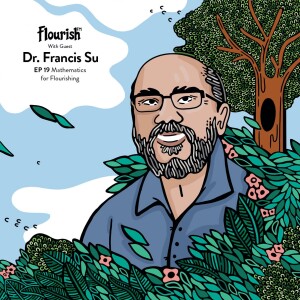
Tuesday Jan 17, 2023
Tuesday Jan 17, 2023
In this episode, we talked to Professor Francis Su about the role of mathematics in flourishing, how mathematics can promote flourishing, and his argument that the purpose of mathematics is to support flourishing.
Francis Su is the Benediktsson-Karwa Professor of Mathematics at Harvey Mudd College and a former president of the Mathematical Association of America. In 2013, he received the Haimo Award, a nationwide teaching prize for college math faculty, and in 2018 he won the Halmos-Ford writing award. His work has been featured in Quanta Magazine, Wired, and the New York Times. His 2020 book Mathematics for Human Flourishing, which won the 2021 Euler Book Prize, offers an inclusive vision of what math is, who it’s for, and why anyone should learn it.
Key conversation points:
Francis’ definition of flourishing as a “wholeness of being and doing” and the way he distinguishes between flourishing and happiness
Francis’ argument on the role of mathematics in human flourishing
How mathematics can cultivate virtues important for flourishing and which virtues mathematics can cultivate in a particularly strong way
Francis’ approach towards teaching mathematics in such a way as to cultivate virtues among students of mathematics, such as creativity and an appreciation for beauty
Francis’ correspondence with Christopher Jackson, an inmate serving a 32-year sentence for armed robberies who started writing to Francis seven years into his sentence, about his passion for mathematics, and the influence this correspondence has had on Francis’ work on mathematics and flourishing, and how he sees mathematics
Francis’ views on how mathematics education needs to change to cultivate virtues
francissu.com
flourishfmpodcast.com
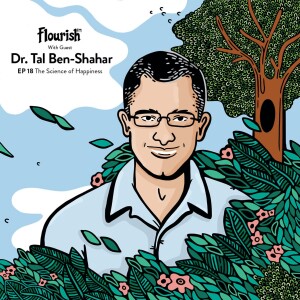
Tuesday Jan 03, 2023
Tuesday Jan 03, 2023
In this episode, we talked to happiness expert Dr. Tal Ben-Shahar about the science of happiness, focusing on his account of happiness as “wholebeing,” comprised of five elements of well-being which make up his “SPIRE” model: Spiritual, Physical, Intellectual, Relational and Emotional well-being.
Tal Ben-Shahar is an author and lecturer who taught two of the largest classes in Harvard University’s history, Positive Psychology and The Psychology of Leadership, and taught Happiness Studies at Columbia University. His books on happiness have been translated into more than thirty languages and have appeared on bestseller lists around the world, and his work has featured on media outlets including CNN, BBC and the Daily Show.
Tal obtained his PhD in Organizational Behavior and BA in Philosophy and Psychology from Harvard. Today he consults and lectures around the world to executives in multinational corporations, including Google and Microsoft, the general public, and at-risk populations. Tal is a serial entrepreneur, and is the co-founder and chief learning officer of Happiness Studies Academy, Potentialife, Maytiv, and Happier.TV.
Key conversation points:
How Tal defines happiness and its relation to flourishing: flourishing is the outcome of happiness
The relation between Tal’s “SPIRE” model of happiness and flourishing, and between happiness and wholeness
Tal’s definition of spirituality as living a life in which we see our activities as meaningful and purposeful
Practices for building spiritual wellbeing: exercise to write down a “calling description” rather than a job description
Tal’s criticism of widespread hurriedness today, and a strategy for going through life in less of a hurry
The connection between happiness and “antifragility”
Antifragility as “Resilience 2.0,” and its connection with post-traumatic growth: not only bouncing back, but becoming stronger and healthier than before
A principle Tal recommends for recovering from trauma: “things don’t happen for the best, but we can make the best of things that happen,” and how to apply this to our lives
The connection between physical exercise and happiness: “not exercising is like taking a depressant”
talbenshahar.com
happinessstudies.academy
flourishfmpodcast.com
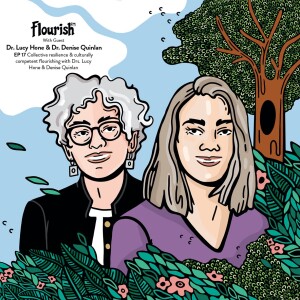
Monday Dec 19, 2022
Monday Dec 19, 2022
In this episode, we talked to Dr Lucy Hone and Dr Denise Quinlan about their work on building well-being and resilience among different populations, and how to develop the most important skills associated with resilience.
Dr Lucy Hone is author of the 2017 book Resilient Grieving: How to Find Your Way Through a Devastating Loss and gave the TED talk ‘3 Secrets of Resilient People’, which was among the Top 20 TED talks of 2020. She is co-author (with Denise Quinlan) of the Educators’ Guide to Whole-school Wellbeing, co-convenor of Wellbeing in Education New Zealand, presenter on many of the New Zealand Institute of Wellbeing and Resilience’s online courses, and has featured in the Guardian, Washington Post, and on the BBC, ABC, Channel News Asia, Swedish Television, The Bolt Report Australia and Television New Zealand.
Dr Denise Quinlan is acknowledged internationally as an outstanding facilitator and trainer, helping people explore wellbeing and resilience. Participants have described training with her as ‘life-changing’. She has worked alongside leading resilience researchers Martin Seligman and Karen Reivich, delivering the Penn Resilience Program in Australia and the UK. Her podcast, ‘Bringing Wellbeing to Life’, was recommended by TED in their culture list for 2020. Denise’s academic research is published internationally, and her publications include the Educators’ Guide to Whole-school Wellbeing, which she co-authored with Lucy Hone. She is co-convenor of Wellbeing in Education New Zealand.
Key conversation points:
What resilience is and the difference between individual and collective resilience. Individual resilience can be thought of as “learning to swim” and collective resilience thought of as “building the pool.” We need both to be truly resilient.
Ways to build resilience, individually and collectively: healthy relationships; having a “mission” in life; cultivating self-awareness, self-regulation and self-compassion; and developing flexible and accurate thinking.
What trauma is and what post-traumatic growth (PTSG) is, and Lucy & Denise’s argument for why PTSG requires struggle after trauma.
Our “explanatory style”: how we explain what has happened to us, and why this is important for well-being and resilience.
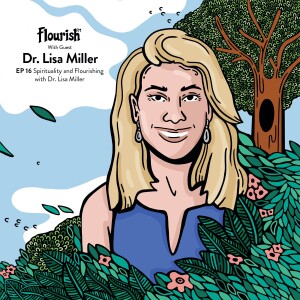
Monday Dec 05, 2022
Monday Dec 05, 2022
In this episode, we talked to Dr. Lisa Miller about the science of spirituality and how we can apply research , the role of spirituality in flourishing and how we can apply research on the science of spirituality to our lives. She has developed a form of psychotherapy known as “spiritual awareness psychotherapy” or “awakened awareness,” which we practice live on the call!
Lisa Miller is the New York Times bestselling author of The Spiritual Child and a professor in the Clinical Psychology Program at Teachers College, Columbia University. She is the Founder and Director of the Spirituality Mind Body Institute, the first Ivy League graduate program and research institute in spirituality and psychology, and has held over a decade of joint appointments in the Department of Psychiatry at Columbia University Medical School. Her innovative research has been published in more than one hundred peer-reviewed articles in leading journals. Lisa is an elected Fellow of the American Psychological Association (“APA”) and the two-time President of the APA Society for Psychology and Spirituality.
Key conversation points:
Research in neuroscience and psychology on the benefits of spirituality for our well-being, such as how spirituality can reduce the risk of depression, anxiety and suicidality
The difference between spirituality and religious belief
The connection between spirituality, meaning, and living a morally good life
The form of psychotherapy Lisa’s developed, “spiritual awareness psychotherapy” (also known as “awakened awareness”), which we practice live on the call!
What “synchronicity” is and the kind of attitude we need to cultivate to perceive synchronicity
The distinction between transcendent and self-transcendent experiences
lisamillerphd.com
flourishfmpodcast.com
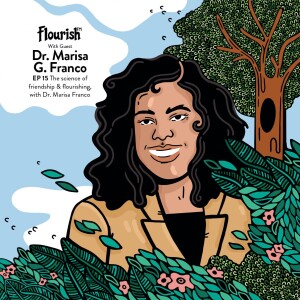
Monday Nov 21, 2022
Monday Nov 21, 2022
Dr. Marisa G. Franco is a psychologist, Professor at the University of Maryland and author of the New York Times bestseller Platonic: How The Science of Attachment Can Help You Make — and Keep — Friends. She writes about friendship for Psychology Today and has been a featured connection expert for major publications including the New York Times, The Telegraph, and Vice. She speaks on belonging at corporations, government agencies, non-profits, and universities. On her website you can take a quiz to assess your strengths and weaknesses as a friend & reach out for speaking engagements.
Key themes for discussion:
The role of friendship in flourishing, and why friendship is so important for flourishing
How we can apply research on attachment styles to cultivate great friendships.
https://www.flourishfmpodcast.com
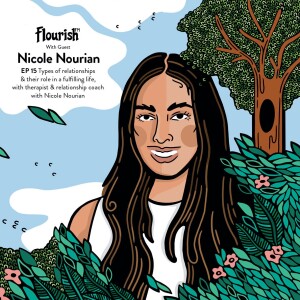
Tuesday Nov 08, 2022
Tuesday Nov 08, 2022
In this episode, we talked to therapist and relationship coach, Nicole Nourian, about healthy relationships and how to build them, character strengths such as resilience and autonomy, the importance of growth in relationships, and how to cultivate “radical acceptance” - coming to terms with difficult events in life outside our control.
Nicole Nourian is a therapist born and raised in LA. Her journey in psychology started at UCLA, where she graduated with a Bachelors of Arts in Psychology and also became a certified yoga instructor and certified life coach, specializing in relationships. Nicole went on to receive her Masters in Clinical Psychology at Pepperdine University, and is currently working as a therapist in LA.
Nicole’s experience includes working with individuals, families, and couples to guide them towards meeting their goals in the healthiest way possible. Nicole does not apply one theory to all her clients but rather approaches each individual with an eclectic approach that fits them best. Nicole has observed in her therapy the crucial importance of romantic and platonic relationships play in our daily lives. Whether it be heartbreak, attachment issues, animosity with loved ones, or maintaining a healthy relationship, Nicole emphasizes the ways in which dissatisfaction with one’s relationships can have a huge impact on one’s mental health.
In her practice, Nicole works hard to break barriers and old habits that may be contributing to one’s happiness. Nicole’s Instagram page has generated millions of views on content relating to self-esteem, relationships, and mental health.
Key conversation points:
Types of relationships, the connections between them and their roles in our lives
Nicole’s argument that our relationship with ourselves is the most important relationship to develop, because of its benefits for our well-being and positive impact on other relationship types
What a healthy relationship with yourself involves and how to build it
What resilience is, its importance to living well, its connection with other psychological concepts such as antifragility and grit, and how to build it
The connection between building healthy relationships and building resilience
What autonomy is and why it is important for relationships
“Radical acceptance”: coming to terms with difficult events in life outside our control - what this involves and how to cultivate it
The importance of individual and mutual growth in healthy relationships
Instagram @BalancewithNic
Booking therapy with Nicole
flourishfmpodcast.com
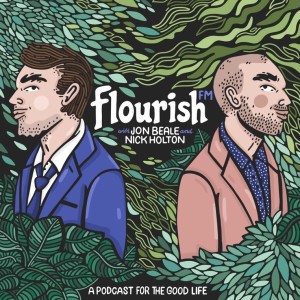
Tuesday Oct 25, 2022
Tuesday Oct 25, 2022
In this episode, we talked to Will Reusch about whether an evil person can live a meaningful life and flourish; what happiness is and how its role in our lives changes depending on how we define it; and the similarities and differences between influential contemporary theories of flourishing.
Will Reusch is an educator and podcaster. For the last thirteen years he has taught multiple subjects at public and private schools in Los Angeles, his main subject being social studies. Since 2019 he has hosted the podcast Cylinder Radio, an educational podcast which focuses on exploring controversial topics.
Will never had an interest in academics at school and struggled to connect what he was learning to build a successful and meaningful life. He came to believe that educational systems designed to teach children to become capable, informed, and equipped seem to fail in achieving these goals for so many young people. Will decided to become a schoolteacher to try to improve this.
Key conversation points:
The importance of morality, character and virtue for flourishing, and possible reasons why evil people cannot live meaningful lives or flourish
Different definitions of happiness and how it takes on different roles in education depending on how it’s defined
The problems with aiming for happiness in education or as an end goal in life
The problems with thinking of happiness as pleasure and the importance of thinking of happiness as a long-term state
Two major theories of flourishing: positive psychology’s “PERMA” model (Positive emotions; Engagement; positive Relationships; Meaning; and Accomplishment) and the Human Flourishing Program at Harvard’s account
williamreusch.com
flourishfmpodcast.com
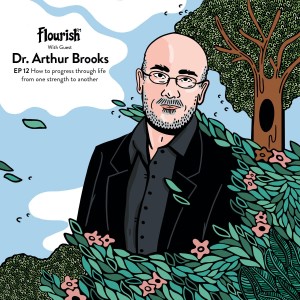
Tuesday Oct 11, 2022
Tuesday Oct 11, 2022
In this episode, we talked to Professor Arthur Brooks about happiness, wisdom, love, relationships, religion and spirituality, and why these are important for our flourishing, particularly as we move into the latter half of our lives.
Arthur C. Brooks is the William Henry Bloomberg Professor of the Practice of Public Leadership at the Harvard Kennedy School and Professor of Management Practice at the Harvard Business School. Before joining Harvard in July 2019, he served for ten years as president of the Washington, D.C.-based American Enterprise Institute, one of the world’s leading think tanks. Brooks is the author of 12 books, including the #1 New York Times bestseller “From Strength to Strength,” and national bestsellers “Love Your Enemies” and “The Conservative Heart”. He has also published dozens of academic journal articles and the textbook “Social Entrepreneurship”. He is a columnist for The Atlantic, host of the podcast “How to Build a Happy Life,” and subject of the 2019 documentary film “The Pursuit,” which Variety named as one of the “Best Documentaries on Netflix” in August 2019. He gives more than 100 speeches per year around the U.S., Europe, and Asia. Prior to his work in academia and public policy, Brooks spent 12 years as a professional French hornist in the United States and Spain.
Key conversation points:
The kinds of relationships that are most important to cultivate and how to cultivate them.
The distinction between “real” and “deal friends”: why focusing on the former is vital for happiness but focusing on the latter leads to loneliness.
How to ensure you have sufficient “real relationships” in your life.
Why love is so important for happiness and flourishing.
The importance of developing a vision of what you love and do.
The two intelligence “curves” in life: moving from fluid to crystallized intelligence.
Why religion, spirituality, philosophy or a connection with something higher are important for flourishing.
Arthur’s most recent book, From Strength to Strength: Finding Success, Happiness and Deep Purpose in the Second Half of Life and the seven words he uses to sum it up: “use things, love people, worship the divine”.
Joining us to interview Arthur is Matthew T. Lee, Professor of the Social Sciences and Humanities at the Institute for Studies of Religion at Baylor University. He is also a Research Associate and Director of the Flourishing Network at the Human Flourishing Program at Harvard University; a member of the Global Study of Human Flourishing research team; a Distinguished Visiting Scholar of Health, Flourishing, and Positive Psychology at Stony Brook University’s Center for Medical Humanities, Compassionate Care, and Bioethics; and Visiting Scholar at the Benson-Henry Institute for Mind Body Medicine at Massachusetts General Hospital.
arthurbrooks.com
flourishfmpodcast.com






